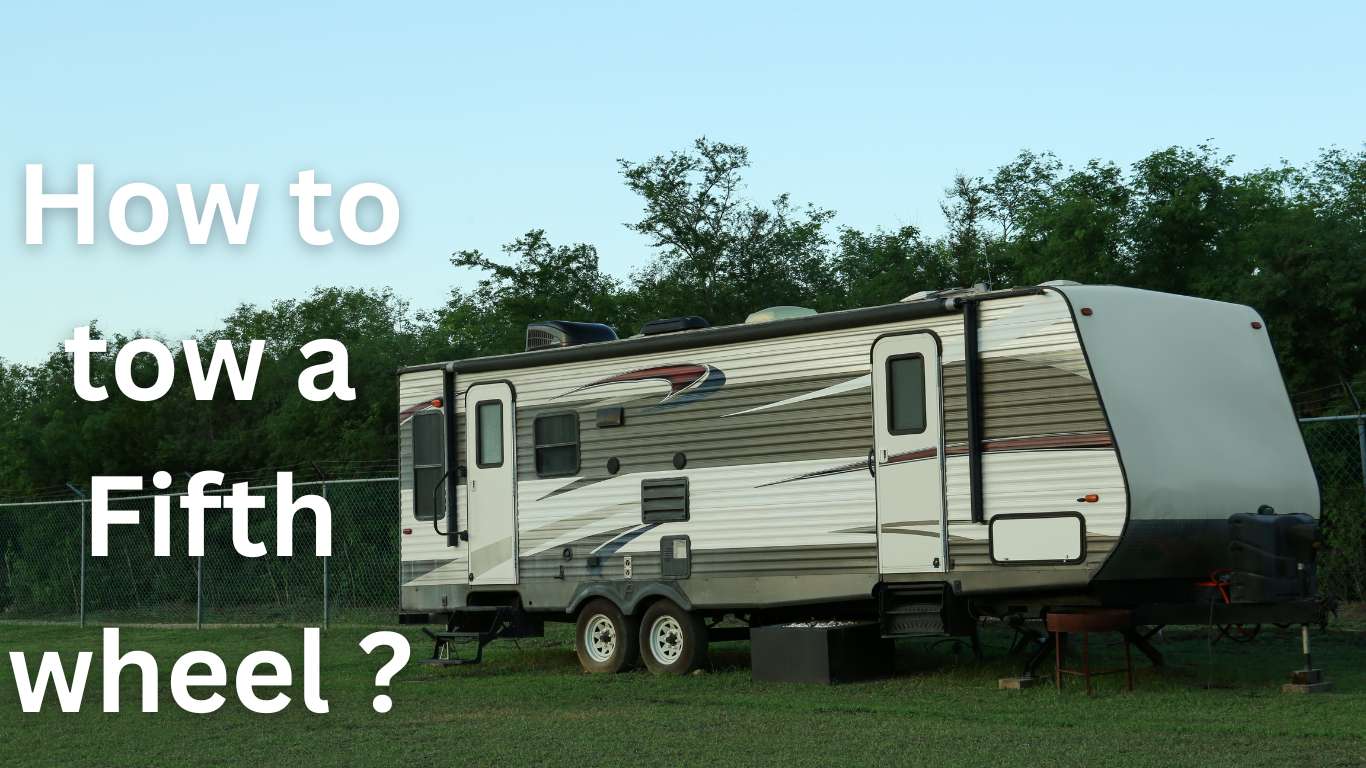Towing a fifth-wheel camper trailer might seem intimidating at first, but with the right steps and preparation, it becomes manageable and enjoyable. Fifth-wheel trailers offer excellent stability and weight distribution, making them a popular choice among RV enthusiasts. Here’s everything you need to know about how to tow a fifth-wheel camper trailer.
What You Need to Tow a Fifth-Wheel Camper Trailer
Choose the Right Tow Vehicle
Before towing a fifth-wheel camper trailer, ensure your vehicle is capable of handling the trailer’s weight. A pickup truck with a fifth-wheel hitch installed in the truck bed is essential. Always check the truck’s towing capacity and the gross vehicle weight rating (GVWR) of your trailer.
Install a Fifth-Wheel Hitch
A fifth-wheel hitch is mounted in the bed of your truck, directly above or slightly forward of the rear axle. This design provides superior stability and maneuverability. Ensure the hitch is securely installed and correctly rated for your trailer’s weight.
Preparing to Tow
Conduct a Safety Inspection
- Check tire pressure on both your truck and trailer.
- Inspect all lights and electrical connections.
- Verify that the hitch is locked and secure.
- Ensure your trailer brakes are functional.
Balance the Load
Distribute the weight evenly inside your fifth-wheel trailer to maintain balance. Overloading or uneven weight distribution can make towing unsafe.
Tips for Safe Towing
Practice Turning and Backing Up
Towing a fifth-wheel camper trailer requires practice, especially for turning and reversing. Find an empty parking lot to get comfortable with your rig’s movement.
Drive Cautiously
While towing, maintain a steady speed, avoid sudden braking, and allow extra space between your vehicle and others. Use wide-angle mirrors for better visibility.
Use Trailer Brakes and Tow Haul Mode
Engage your truck’s tow/haul mode, which adjusts the transmission for better control. Always use the trailer brakes when descending steep hills to prevent overheating your truck’s brakes.
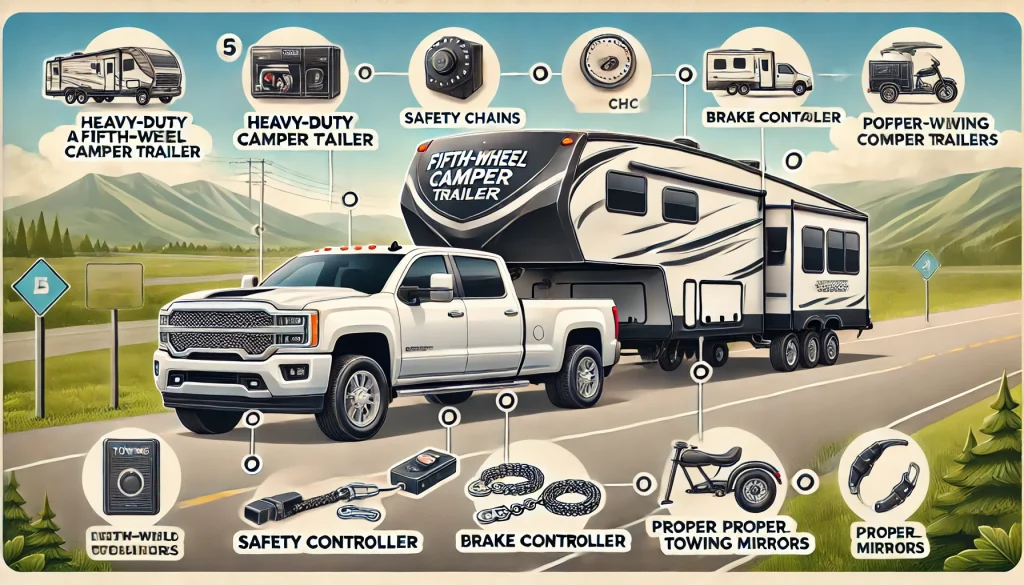
Is It Difficult to Tow a Fifth-Wheel Camper Trailer?
Towing a fifth-wheel camper trailer may seem challenging at first, but with the proper preparation, it becomes much easier. Fifth wheels are designed to provide exceptional stability and control, making them one of the most user-friendly RV types to tow. Let’s explore whether towing a fifth-wheel camper trailer is difficult and how you can make it a stress-free experience.
Why Towing a Fifth-Wheel Camper Trailer Is Easier Than You Think
Superior Stability
The fifth-wheel hitch, mounted directly in the bed of your truck, provides better weight distribution and stability than bumper-pull trailers. This design minimizes sway, even in windy conditions or during highway driving.
Improved Maneuverability
Compared to other types of trailers, fifth-wheel camper trailers offer a tighter turning radius. This feature makes them easier to maneuver in tight spaces, such as campgrounds or parking lots.
Challenges of Towing a Fifth-Wheel Camper Trailer
Requires a Pickup Truck
To tow a fifth-wheel, you’ll need a capable pickup truck with a properly installed fifth-wheel hitch. Not having the right tow vehicle can make towing challenging or even unsafe.
Height and Length Considerations
Fifth-wheel trailers are often taller and longer than other RV types. You’ll need to pay extra attention to low-clearance bridges and allow additional space for turning and parking.
Tips to Make Towing Easier
Practice Makes Perfect
Spend time practicing in a safe, open area to get familiar with turning, reversing, and braking while towing your fifth wheel.
Use Tow Mirrors and Cameras
Wide-angle mirrors or backup cameras provide better visibility, reducing blind spots and helping with safe lane changes or parking.
Plan Your Route Ahead
Always plan your route to avoid roads with tight turns, steep grades, or height restrictions. Having a clear route reduces stress while towing.
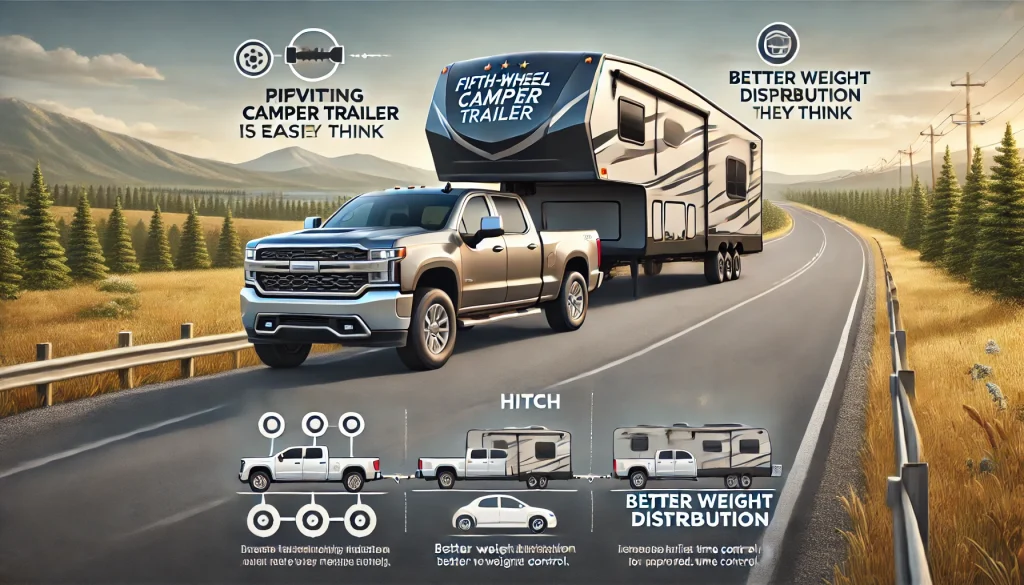
What Are the Benefits of Fifth-Wheel Towing?
Fifth-wheel towing offers several advantages that make it a top choice for RV enthusiasts. From enhanced stability to spacious living areas, fifth-wheel camper trailers provide a superior towing experience compared to other trailer types. Here’s an overview of the key benefits of fifth-wheel towing.
Enhanced Towing Stability
Superior Weight Distribution
Fifth-wheel camper trailers connect to the tow vehicle via a hitch mounted in the truck bed, directly above the rear axle. This placement ensures better weight distribution, resulting in reduced trailer sway and a more stable towing experience, even in windy conditions or on uneven roads.
Better Control on the Road
With the hitch design of fifth wheels, drivers experience improved handling and maneuverability. This makes navigating highways, steep grades, and sharp turns more manageable than with bumper-pull trailers.
Increased Living Space
Spacious Interiors
Fifth-wheel camper trailers often have taller ceilings and multiple slide-outs, providing a more comfortable and roomy interior. This makes them ideal for extended trips or full-time RV living.
Separate Living Areas
The unique design of fifth wheels typically includes distinct living, dining, and sleeping areas. This layout offers more privacy and convenience for families or groups.
Easier Maneuverability
Tighter Turning Radius
Fifth-wheel trailers are easier to maneuver, thanks to their connection point being closer to the center of the tow vehicle. This tighter turning radius is especially useful in campgrounds or other tight spaces.
Backing Up Made Easier
Reversing a fifth wheel is generally simpler compared to other types of trailers because of its hitch design. With some practice, backing into campsites or driveways becomes less stressful.
Additional Benefits
High Tow Capacity
Fifth wheels are designed to accommodate heavier loads without compromising stability. This makes them suitable for larger families or travelers needing extra storage space.
Comfortable Ride for Long Distances
The balanced weight distribution and reduced sway create a smoother ride for both the driver and passengers, even on long journeys.
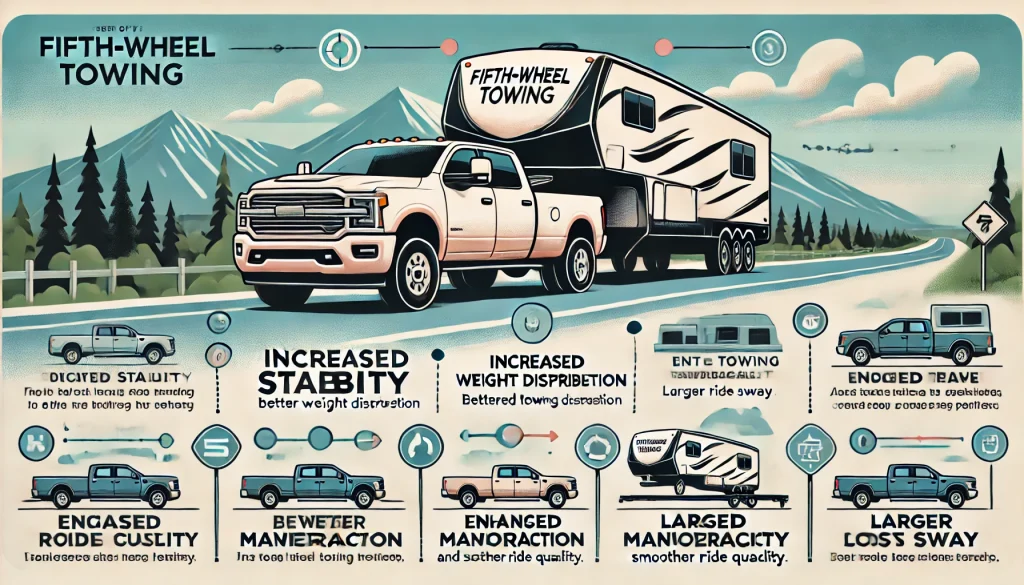
Can You Tow a Fifth Wheel with a Regular Hitch?
No, you cannot tow a fifth-wheel camper trailer with a regular hitch. Fifth wheels require a specialized hitch that is mounted in the bed of a pickup truck. This unique design is essential for safely towing the trailer and providing the stability and control fifth wheels are known for. Let’s dive into why a regular hitch won’t work and explore the importance of a fifth-wheel hitch.
Why a Regular Hitch Won’t Work
Fifth-Wheel Hitch Placement
Unlike a regular ball hitch attached to the rear bumper of a tow vehicle, a fifth-wheel hitch is installed in the truck bed, directly above or slightly forward of the rear axle. This position supports the trailer’s weight effectively, ensuring proper weight distribution and reducing sway.
Connection Design Differences
Fifth-wheel hitches use a kingpin connection that locks into the hitch mechanism in the truck bed. Regular hitches, which rely on a ball and coupler design, are not built to handle the size, weight, and unique dynamics of a fifth-wheel camper trailer.
Benefits of Using a Fifth-Wheel Hitch
Enhanced Stability and Safety
The in-bed hitch design provides greater stability and reduces trailer sway, making it safer for towing large fifth-wheel trailers on highways and uneven roads.
Improved Towing Capacity
Fifth-wheel hitches are designed to handle higher weight limits compared to regular hitches, making them ideal for heavier RVs.
Alternatives to a Fifth-Wheel Hitch
Gooseneck Adapter
If you already have a gooseneck hitch, you can use a gooseneck-to-fifth-wheel adapter. However, this setup may not offer the same stability and smooth towing experience as a traditional fifth-wheel hitch.
Invest in a Fifth-Wheel Hitch
The best option for towing a fifth-wheel camper trailer is to invest in a dedicated fifth-wheel hitch that’s properly installed in a compatible pickup truck.
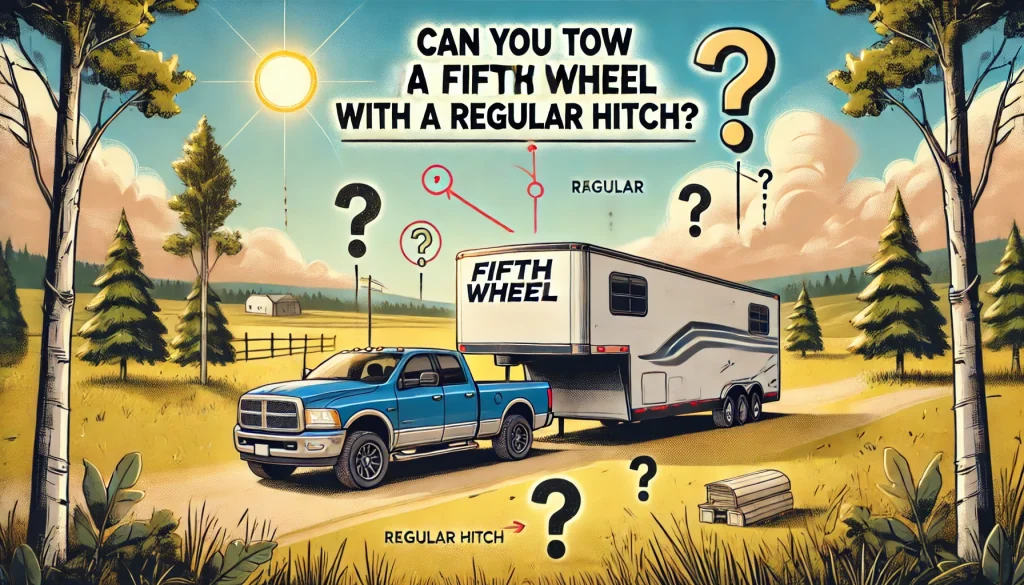
Steps to Tow a Fifth-Wheel Camper Trailer
Towing a fifth-wheel camper trailer requires the right equipment and careful preparation. By following these steps, you can ensure a safe and smooth towing experience. Here’s a detailed guide on how to tow a fifth-wheel camper trailer.
Step 1: Check Your Tow Vehicle
Ensure Compatibility
Verify that your pickup truck can handle the weight of your fifth-wheel camper. Check the truck’s towing capacity and ensure it matches the gross vehicle weight rating (GVWR) of your trailer.
Install a Fifth-Wheel Hitch
A fifth-wheel hitch must be securely mounted in the bed of your truck, directly above or slightly ahead of the rear axle. Proper installation is crucial for stability and control while towing.
Step 2: Prepare the Fifth-Wheel Camper
Inspect the Trailer
- Check tire pressure and tread condition.
- Test the lights, brakes, and electrical connections.
- Secure all items inside the trailer to prevent shifting while towing.
Adjust the Weight
Distribute the load evenly inside your trailer. Avoid overloading or placing too much weight on one side, as it can affect handling.
Step 3: Hitch the Fifth Wheel
Align the Truck and Trailer
Back your truck up slowly to align the fifth-wheel hitch with the trailer’s kingpin. Use a spotter or backup camera for better accuracy.
Secure the Connection
- Lower the trailer’s kingpin into the fifth-wheel hitch.
- Ensure the hitch locks securely around the kingpin.
- Attach the safety chains and connect the breakaway cable for added security.
Step 4: Test Before Hitting the Road
Perform a Safety Check
- Double-check that the hitch is locked.
- Test the trailer brakes and lights.
- Walk around your rig to ensure everything is secure and in place.
Adjust Your Mirrors
Set your side mirrors to provide a clear view of the trailer and surrounding traffic. Consider installing extended tow mirrors for better visibility.
Step 5: Drive Safely
Take It Slow
When towing a fifth-wheel camper trailer, drive at a steady speed and allow extra time for braking and turning.
Practice Maneuvering
Fifth wheels have a tighter turning radius, so practice navigating corners and backing up in an open area to gain confidence.
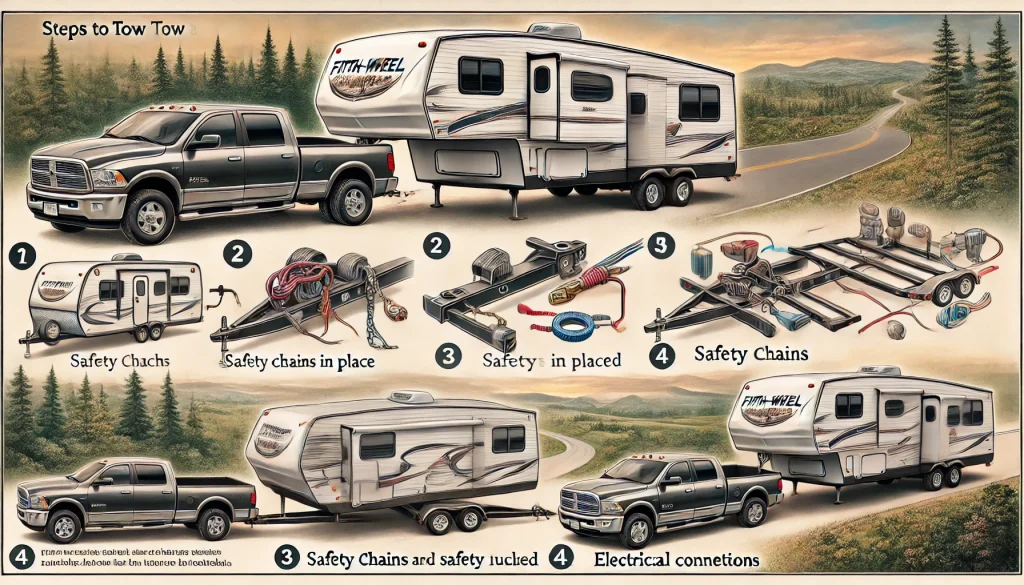
How to Tow Different Classes of Fifth Wheels
Towing different classes of fifth-wheel camper trailers involves understanding their unique features, weights, and requirements. While the towing process is generally similar, knowing the specific needs of lightweight, mid-size, and luxury fifth wheels can ensure a safe and efficient towing experience. Here’s a breakdown of how to tow different classes of fifth wheels.
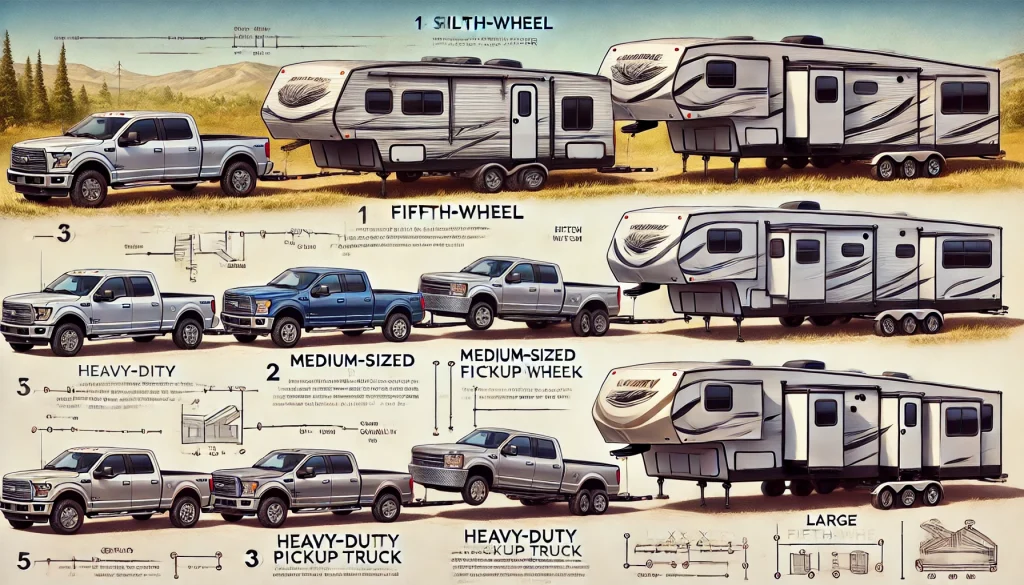
Towing Lightweight Fifth Wheels
Characteristics of Lightweight Fifth Wheels
- GVWR: Typically under 10,000 pounds.
- Suitable for half-ton or smaller pickup trucks.
- Compact size makes them easier to tow and maneuver.
Towing Tips for Lightweight Fifth Wheels
- Choose the Right Truck: Verify your truck’s towing capacity to ensure it can handle the trailer’s weight. Half-ton trucks with fifth-wheel hitches are often sufficient.
- Practice Maneuvering: Lightweight trailers are shorter and easier to maneuver, but practice turning and backing up to master their handling.
- Monitor Weight Distribution: Even with lighter trailers, distribute the load evenly for a balanced towing experience.
Towing Mid-Size Fifth Wheels
Characteristics of Mid-Size Fifth Wheels
- GVWR: Between 10,000 and 15,000 pounds.
- Typically require a three-quarter-ton pickup truck for towing.
- Offer more spacious layouts while maintaining maneuverability.
Towing Tips for Mid-Size Fifth Wheels
- Upgrade to a Larger Truck: Mid-size fifth wheels often need a three-quarter-ton truck with a higher towing capacity.
- Install a High-Quality Hitch: Ensure your hitch is rated for the trailer’s weight to avoid instability.
- Plan Your Route: Mid-size trailers may require more clearance for turns and parking, so plan ahead to avoid tight spots.
Towing Luxury Fifth Wheels
Characteristics of Luxury Fifth Wheels
- GVWR: Over 15,000 pounds.
- Feature premium materials, multiple slide-outs, and taller ceilings.
- Require heavy-duty trucks for towing.
Towing Tips for Luxury Fifth Wheels
- Use a Heavy-Duty Truck: Luxury fifth wheels typically require a one-ton or dually truck for safe towing. These trucks offer the power and stability needed for larger trailers.
- Install an Advanced Hitch System: Consider a sliding hitch for short-bed trucks to prevent the front cap from hitting the cab during sharp turns.
- Check for Height Clearance: Luxury fifth wheels are taller, so watch for low bridges and overpasses when planning your route.
General Towing Tips for All Classes
Inspect Your Rig Before Departure
- Check tire pressure on both the truck and trailer.
- Ensure the hitch is securely locked, and the safety chains are attached.
- Test trailer brakes and lights.
Practice Safe Driving
- Drive at a steady speed, and allow extra space for braking.
- Avoid sudden turns or lane changes to maintain stability.
More related details will be available on Flamingo Motorhomes.

